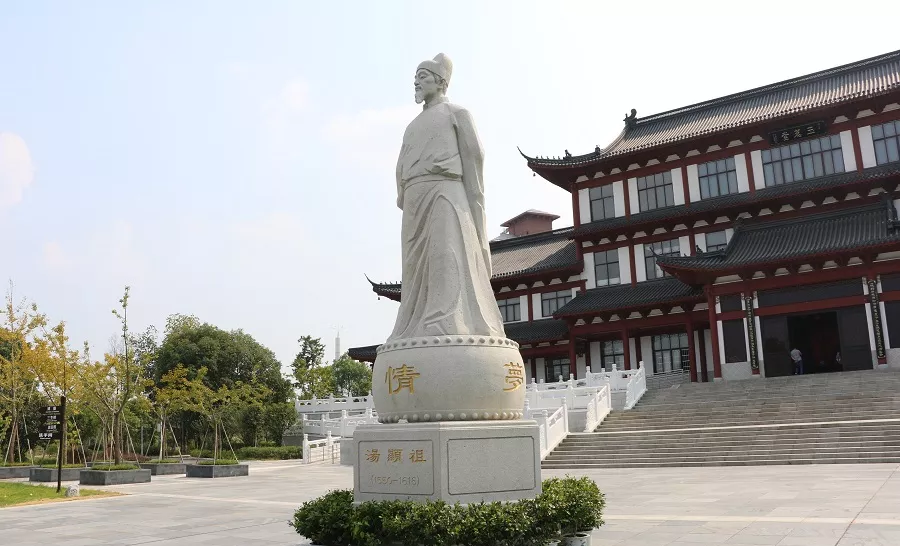
Tang Xianzu Memorial Hall
Tang Xianzu was a famous opera composer in ancient China, and the Tang family was also a famous scholar in Linchuan (present-day Linchuan, Jiangxi). Since his ancestor Wende opened Up Jiwen Changli (outside the old city of Fuzhou), this Tang clan settled here, passed on the poetry to the family, cultivated and read successively, and continued to live for generations. Tang Xianzu is one of the representative figures, and his Qi family way is especially worth learning from future generations.
Passing on the word of poetry to the family
The poetry and book family is a long-standing tradition of the Tang family, and the ancestors of Tang Xianzu were known for their erudition for four generations: Gao Zu and great-grandfathers collected books and good literature; grandfather Tang Maozhao read a lot of books, "looking forward to Ru Lin"; his father Tang Shangxian was also a knowledgeable Confucian and bibliophile, "for Wen Gaogu, held a duanfang", and "built a family school to open up jixu", attaching great importance to family education. Tang Xianzu said in the "Guangyi Fu": "The dove testament covers 40,000 volumes of Yu Xi, zhao Yu Zeng and Yu Zu", and the poetry books handed down from the hands of the great-grandfather reached more than 40,000 volumes.
Tang Xianzu inherited the family education tradition, attached great importance to reading and learning, and always warned his children that they should study hard, and he wrote in poems such as "Zhengjue Temple Shows His Brother Ruzu" and "Watching and Performing New People and Horses Show His Nephews", "The white hair between the windows is a melancholy mirror, and the head of the candle at the bottom of the candle persuades to read", "Ninety-five ride the clouds like gold, who is my family's foal". Under his encouragement, the eldest son, Tang Shixuan, and the third son, Tang Kaiyuan, were lifted one after another, and the context was endless.
Pass on the word of innocence
Tang Xianzu was known for his honesty and integrity as an official, and was consistent whether he lived above the temple or far away from the rivers and lakes. As early as the period of his imperial examination, he strictly refused to solicit powerful people, and when he was later appointed as the commander of Suichang County, he rectified the county administration and made the government clean. He once said that "to be a county official, Yu Lu has no love for him", and took the initiative to donate feng Lu to build a county school. After his departure, the people were very reluctant and built a shrine for him to remember his kindness. After hearing this news, he still felt guilty, and sighed in the letter "With the Doorman Shi Junke": "Pyeongchang worships me, why do I worship Pyeongchangya?" ”
Tang Xianzu's Qing Zhengde disciples were deeply infected. On weekdays, he continued to teach his children, and after resigning from the government and returning to hiding, he still did not forget to educate his descendants that "the Tao family only plants willows, and the jade tree Zhilan is not much", hoping that his descendants will aspire to be a clean and fragrant Zhilan Yushu and not fall into the Tang family style.
Pass on the righteousness of thrift and diligence
The thriftiness of men and women and the prosperity of the family are the most simple expectations of his family. In "Wangqi'er", he said: "Wandering is not a child's business, and it is a good time to return to learn to farm." In "The Inner Man Enters the Fast", he praised his wife: "Kiyozai vegetarian clothes are like the moon, and I appreciate the jasmine flowers." "Diligence and thrift are the reason for the prosperity of this cultivating family, and it is also the root of its long-term prosperity. As he said in the "Zhizhi Yong Shizi": "There is wisdom in the party with ambition, and there is wisdom that has ambition." Only hard work can give birth to lofty ambitions; as he wrote in "The Song of Grains": "Grains of rice, what I have entered, I really can weep if I do not cherish them." The book is really pitiful if I don't cherish it", only frugality can make people know how to cherish. Therefore, until his death, Tang Xianzu still used the "Seven Prayers for Exemption" group of poems to illustrate his descendants: to simply handle the aftermath for himself, to spend frugally, and the money saved can be donated to fund education.
Tang Xianzu's life is extremely legendary, although he is talented, but because of his straightforward personality and straight path, his career path is quite bumpy. After experiencing "fifteen years of eunuchs like a dream", nearly half a hundred years old, he began to immerse himself in opera creation and opened the peak of creation. The special life trajectory makes Tang Xianzu's educational concept very distinctive, not a face-to-face teaching, but a vivid and witty one; not "only reading is high", but to help the world. He turned his true feelings into poetry and aphorisms, integrated them into singing a play, passed them on to his descendants, and also warned the world.
◎ This article was originally published in the "Learning Times" (author Xu Weipeng), the source network, the copyright of the picture and text belongs to the original author.